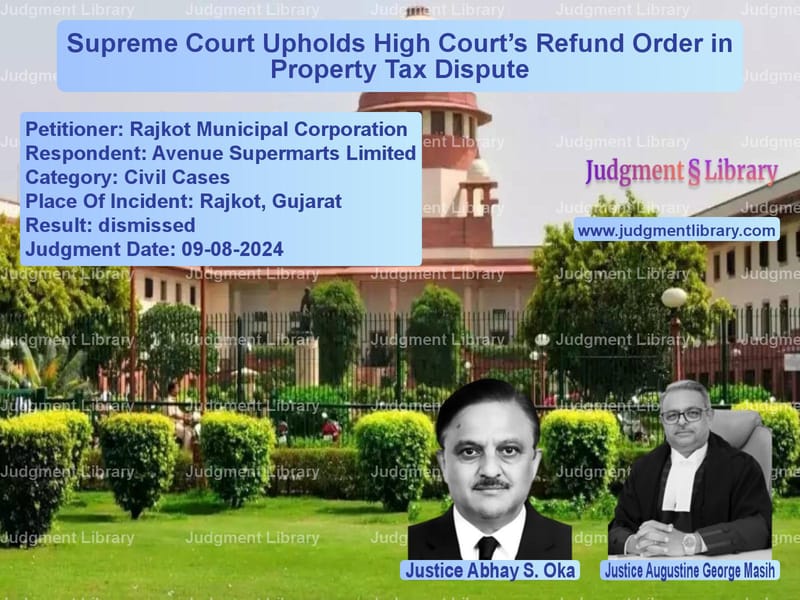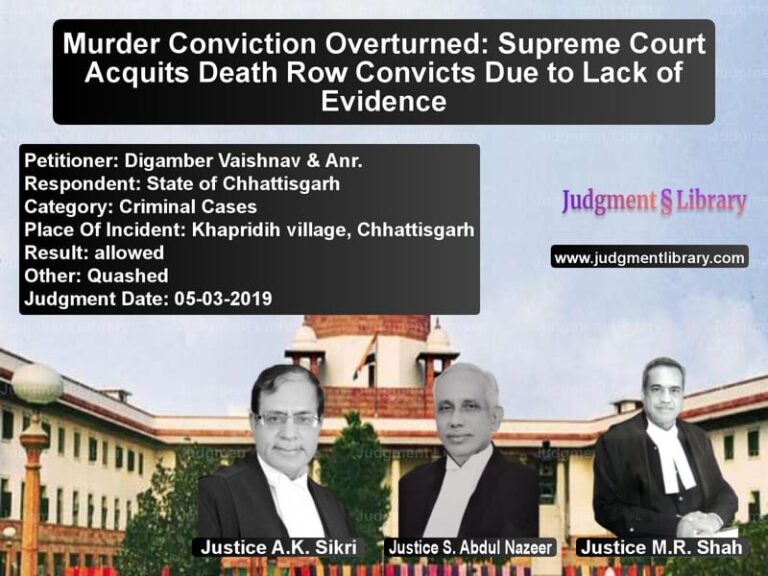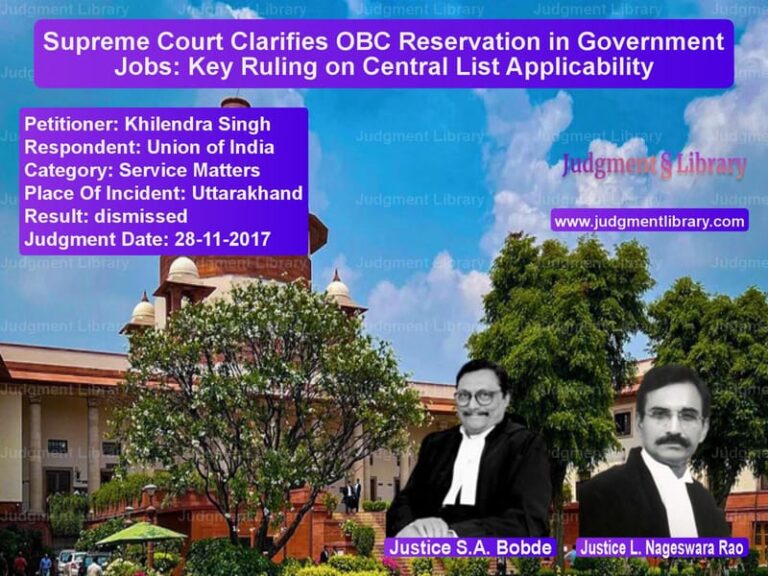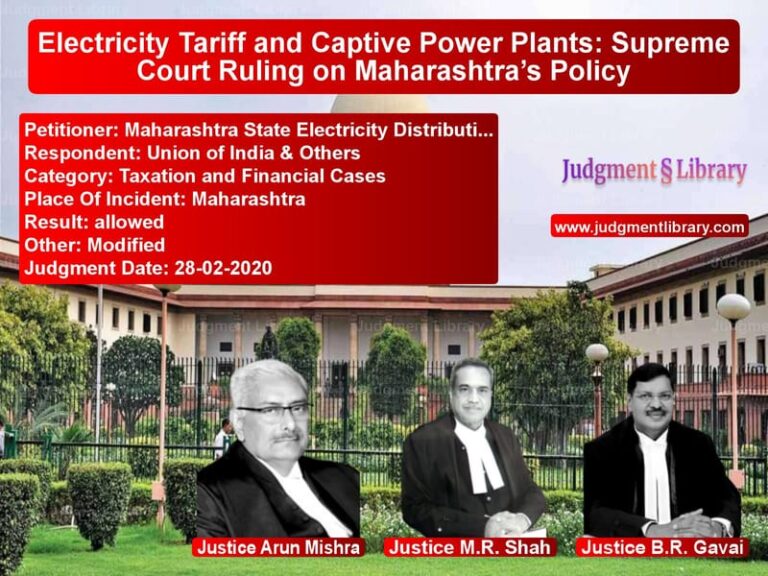Supreme Court Upholds High Court’s Refund Order in Property Tax Dispute
The Supreme Court recently delivered its judgment in the case of Rajkot Municipal Corporation vs. State of Gujarat, affirming the High Court’s order directing the municipal corporation to refund a portion of the property tax paid by Avenue Supermarts Limited (Respondent No. 02). The case revolved around the payment of property tax arrears, where the Appellant-Corporation sought to recover outstanding dues, including penalties, from the new property owner, Avenue Supermarts, for the period prior to their acquisition of ownership.
Background of the Case
The dispute began when the Rajkot Municipal Corporation (Appellant) issued a demand for property tax from Avenue Supermarts Limited for the assessment year (AY) 2015-16, amounting to INR 2,97,02,324 (Rupees Two Crores Ninety-Seven Lakhs Two Thousand Three Hundred and Twenty-Four Only). The property in question, a commercial complex known as Shivlink-IV, was acquired by Avenue Supermarts on September 3, 2015, through a deed of conveyance from its predecessors-in-interest, Respondent Nos. 04 and 05.
Prior to this transfer of ownership, the property had outstanding dues, and the Appellant issued notices for recovery, demanding payment of the arrears, along with penalties. The property was even sealed due to non-payment of dues by the predecessors, but the new owner (Respondent No. 02) contested this demand, arguing that they should not be liable for tax arrears arising before the transfer of ownership.
Read also: https://judgmentlibrary.com/supreme-court-upholds-acquittal-in-cheque-bounce-case-under-ni-act/
Legal Issues
- Whether Avenue Supermarts (Respondent No. 02) should be liable for the property tax dues of the previous owner.
- The applicability of the provisions under the GPMC Act, 1949 concerning the liability of the property owner and occupier in property tax disputes.
- Whether the Appellant was entitled to recover tax arrears along with penalties from the new owner, despite the earlier disputes being under adjudication.
Petitioner’s Arguments
The Rajkot Municipal Corporation argued that:
- Under Sections 139 and 140 of the GPMC Act, 1949, the Corporation is authorized to recover property tax dues from the current occupier or owner if the previous owner fails to settle the dues.
- The Appellant was entitled to recover the outstanding tax from Respondent No. 02, who had taken over the property and thus assumed responsibility for all liabilities attached to it.
- Respondent No. 02 should have paid the arrears arising from the previous owner’s default, as stipulated under the GPMC Act.
- The deposit of INR 2,50,00,000 (Rupees Two Crores and Fifty Lakhs Only) by the predecessor owners as security did not absolve Respondent No. 02 of their obligation to settle the arrears.
Respondent’s Arguments
Respondent No. 02, Avenue Supermarts, countered that:
- The property was purchased from the predecessors-in-interest, and ownership transferred on September 3, 2015. Therefore, they should only be liable for property tax dues from that date onward, not before.
- The earlier property tax demands had been challenged by the lessee (Respondent No. 03) in multiple forums, and a stay was granted on the recovery of the outstanding dues until those challenges were adjudicated.
- The deposit of INR 2,50,00,000 by the predecessors was meant solely as a security, not as an admission of liability by Respondent No. 02.
- The Appellant should not be allowed to recover taxes for periods before the acquisition of ownership by Respondent No. 02, as this would be unfair and contrary to established legal principles.
Supreme Court’s Observations
The Supreme Court, after reviewing the facts, made the following observations:
- The property tax liability for periods before September 3, 2015 (the date of transfer of ownership) cannot be shifted to the new owner, Avenue Supermarts, under the provisions of the GPMC Act.
- It was clear that Respondent No. 02 had not incurred any tax liabilities for the period before they acquired ownership, and thus they were only responsible for the taxes applicable from that date onward.
- The High Court had rightly noted that the Appellant-Corporation could not seek recovery of dues related to the period before September 3, 2015, from Respondent No. 02.
- Furthermore, the Court found that the Appellant had already refunded the amount in excess of what was due for the relevant period, which was the correct course of action under the circumstances.
Final Judgment
On August 9, 2024, the Supreme Court ruled:
- The Impugned Order passed by the High Court was upheld, and the direction to refund the property tax amount, with simple interest, was justified.
- The Appellant was directed to retain the portion of the tax liability corresponding to the period after September 3, 2015 and refund the excess amount paid by Respondent No. 02 for the earlier period.
- The Court emphasized that such disputes must be resolved in accordance with the principles of equity and fairness, ensuring that the new owner is not unfairly burdened with past liabilities.
Implications of the Judgment
This ruling has important implications for property tax disputes:
- Clarification of Liabilities in Property Transfers: The judgment reinforces that new property owners are only liable for taxes from the date of transfer of ownership, not for arrears incurred before.
- Role of Legal Framework in Property Tax Recovery: It underscores the need for local authorities to adhere to the legal framework provided under the GPMC Act when seeking recovery from new property owners.
- Ensuring Fairness in Tax Demands: The ruling prevents municipalities from overburdening new property owners with arrears from previous owners, especially when legal disputes over such amounts are ongoing.
Conclusion
The Supreme Court’s decision in the case of Rajkot Municipal Corporation vs. State of Gujarat reaffirms the importance of clarity in property tax liabilities and the rights of property owners. By upholding the High Court’s direction to refund the excess tax, the Court has ensured that municipal authorities act in a fair and legally sound manner when recovering outstanding dues. This judgment serves as a crucial precedent for future property tax disputes and emphasizes the need for municipalities to respect legal principles and fairness in their recovery actions.
Petitioner Name: Rajkot Municipal Corporation.Respondent Name: Avenue Supermarts Limited.Judgment By: Justice Abhay S. Oka, Justice Augustine George Masih.Place Of Incident: Rajkot, Gujarat.Judgment Date: 09-08-2024.
Don’t miss out on the full details! Download the complete judgment in PDF format below and gain valuable insights instantly!
Download Judgment: rajkot-municipal-cor-vs-avenue-supermarts-li-supreme-court-of-india-judgment-dated-09-08-2024.pdf
Directly Download Judgment: Directly download this Judgment
See all petitions in Contract Disputes
See all petitions in Property Disputes
See all petitions in Damages and Compensation
See all petitions in Landlord-Tenant Disputes
See all petitions in Judgment by Abhay S. Oka
See all petitions in Judgment by Augustine George Masih
See all petitions in dismissed
See all petitions in supreme court of India judgments August 2024
See all petitions in 2024 judgments
See all posts in Civil Cases Category
See all allowed petitions in Civil Cases Category
See all Dismissed petitions in Civil Cases Category
See all partially allowed petitions in Civil Cases Category







